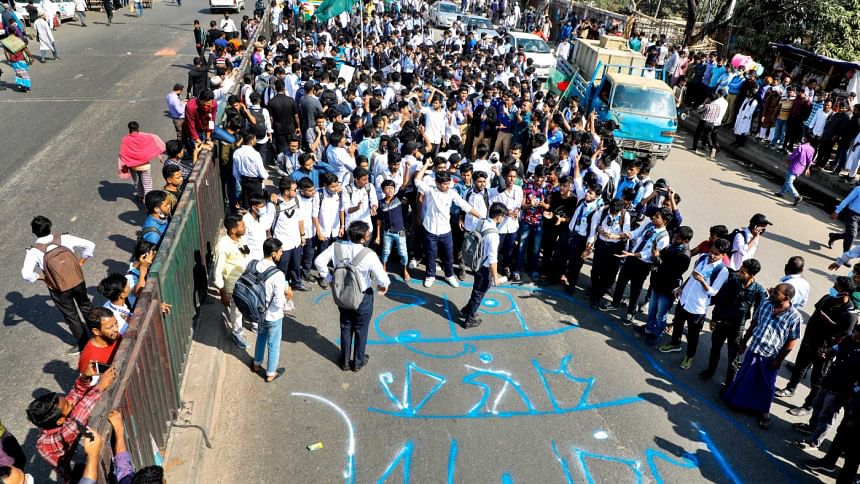When will the anarchy on our roads end?

According to a study conducted by Nirapad Sarak Chai, a road safety movement led by actor and activist Ilias Kanchan, based on reports published by different media outlets, as many as 4,092 road accidents took place across Bangladesh in 2020, taking 4,969 lives and injuring 5,058 more people. Meanwhile, in the first eight months of 2021, 3,701 road accidents took place across the country, killing at least 3,502 people and injuring 3,479 others, according to a report by the Bangladesh Police.
The fact that the number of fatalities caused by road accidents between January 2020 and August 2021 is nearly one-third of the deaths caused by the coronavirus pandemic in the country since March last year reveals the true horror when it comes to safety—or lack thereof—in our roads.
On July 29, 2018, the death of two college students after being hit by an unlicensed driver, who was driving his bus recklessly, sparked a nationwide protest by school and college students that challenged the traffic system and demanded safety on roads. Students made demands to curb violation of traffic rules and reckless driving, besides fixing other irregularities on our roads and highways.
In response to the protest, the government promised to bring discipline to the streets. It has been more than three years since then, but there has hardly been any effective change.
Now, students have taken to the streets in Dhaka again as bus owners are refusing to allow "half pass" or 50 percent discount on bus fares for the students. The Bangladesh Road Transport Authority (BRTA) is in a dilemma in this situation as they cannot officially force the privately run bus services to give concessions to students.
The disorder that we see on our roads are the symptoms caused by some underlying diseases—political influence and corruption in the transportation sector. Over the past several decades, the budget for developing communication infrastructure has been increased every year. In the 2020-21 fiscal year, the allocation proposed for developing roads, bridges, railways, waterways, airways and the overall communication infrastructure sector was Tk 64,580 crore. Despite such a huge expenditure, this sector remains in shambles because of the corruption in the responsible departments. Most of the roads and highways in the country are poorly constructed, at high costs, by some politically backed contractors with no accountability. Consequently, Bangladesh has one of the worst road communication infrastructures in Asia—second only to Nepal—according to a World Economic Forum survey released in 2018.
As the roads and highways are constructed with substandard materials, the surfaces are damaged quickly. Many vehicle owners, drivers and conductors believe that they are forced to spend extra hours in traffic jams and extra money for servicing and maintenance of their vehicles because of these poorly constructed roads.
Another source of pain and suffering is the corruption committed by some of the officials in the BRTA. According to Transparency International Bangladesh (TIB) reports in the past several years, the BRTA has emerged as one of the most corrupt agencies in the country. From vehicle registration and route permit to transfer of ownership and issuing driving licence, vehicle owners and drivers have to pay up to Tk 20,000 to BRTA personnel and brokers. Around 61 percent of drivers get a driving licence without even taking a driving test—just by paying a bribe of Tk 1,000 to Tk 7,000.
Even though the Anti-Corruption Commission (ACC) has sued several BRTA officials for irregular activities, the rampant corruption that takes place in this agency has yet to stop.
According to numerous vehicle owners, drivers and conductors, extortion and bribery on the roads by some traffic police officials and corrupt local leaders are daily phenomena. Several reports by newspapers and TV channels suggest that a section of traffic police collects money from all commercial vehicles in the name of "beats." Bus owners have to pay Tk 10,000 to Tk 30,000 in bribes to enter the metropolitan areas.
While workers in the transport sector—having suffered devastating losses due to the countrywide lockdowns and the impacts of the pandemic—are struggling to recover from said loss, the Bangladesh Petroleum Corporation (BPC) suddenly raised the price of diesel by Tk 15 per litre. People related to this sector reacted belligerently after the government's decision to increase the fuel price. Finally, through negotiation, they managed to convince the government to increase the bus fare but refused to give any concession to students.
Political influence, widespread corruption, mismanagement and poor policies make commercial vehicle owners and transportation workers reckless and indifferent to the law, which leads to chaos and anarchy on the roads. Consequently, the middle- and low-income people, for whom public transport is the only means of communication, suffer endlessly on the roads and highways. As the rich and the powerful use their private transports, there is no one to empathise with the suffering of public transport users.
Therefore, the relevant authority should take immediate measures to bring order to the chaos in our roads, and abolish corruption and political influence from the transportation sector. When it comes to a 50 percent discount for students on bus fares, the government should develop ways to provide incentives to this sector so that the vehicle owners, drivers, conductors and the people related to this sector can survive, and at the same time can offer a concession to the students. We must make our roads and highways safe for our future generations.
Md Kawsar Uddin is assistant professor of English at the International University of Business Agriculture and Technology (IUBAT).

 For all latest news, follow The Daily Star's Google News channel.
For all latest news, follow The Daily Star's Google News channel. 



Comments